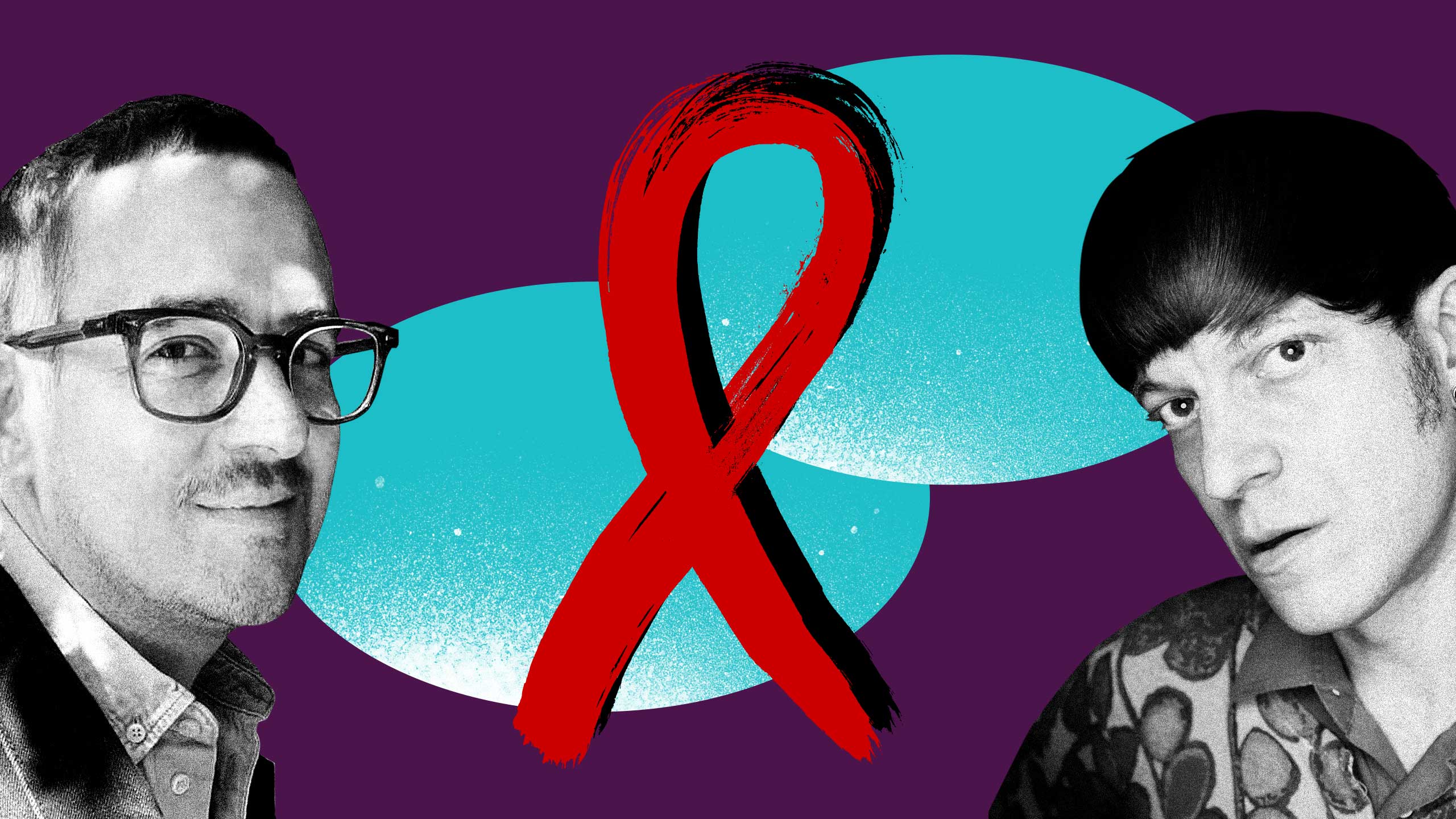Forty years ago, the first reports surfaced of what health officials would later deem the HIV/AIDS epidemic. The crisis that would claim hundreds of thousands of queer and trans lives has often been thought of in generational terms: a deadly virus that stole a generation; a treatable virus for a generation of queers who followed. But what’s often forgotten in these conversations are the in-betweeners, a lost generation who came out and came of age as AIDS ravaged communities. How do they reconcile the loss they’ve witnessed while celebrating the medical advances made to help end the epidemic and keep them alive?
To better understand this complicated position, American author Mattilda Bernstein Sycamore has compiled a new collection of essays, Between Certain Death and a Possible Future. In it, Sycamore and 39 contributors contemplate their generation’s place in understanding the AIDS crisis.
Alexander McClelland, who contributed an essay to the book, sat down with Sycamore to talk about their early understanding of the virus, learning to grieve, overcoming stigma and what an end to AIDS really means.
Hearing about AIDS for the first time
Mattilda Bernstein Sycamore: I was at the supermarket with my mother when I was 12, and I looked at a National Enquirer headline in line and it said, “Rock Hudson is gay.” And that, in my memory, was the first time I heard of a gay person in the world. I mean, I was taunted for being a faggot and being a sissy, being gay, being a girl, ever since I was a child, but I hadn’t heard of a confirmed [gay] person in the world. So I asked my mother, “Who’s Rock Hudson?” and she said, “A famous actor.” But when I was looking back at that headline, I realized that actually it doesn’t say that he was gay; it says that he was dying of AIDS. I realized that I came of age at a time when dying of AIDS and being gay were so intertwined that they felt like the same thing. Being queer meant that you are going to die from AIDS. The idea for the anthology was to look at that generational experience—growing up with desire and death so intertwined, and that being part of what it meant to become queer.
Alexander McClelland: I actually don’t remember when I first heard of AIDS. My father’s gay, and my parents got divorced when I was really young, so I just have always kind of known of it. I went to an alternative high school, and I also got harassed all through my school years for being effeminate and being a sissy and being a faggot. But in school I did a project on HIV when I was like 16. I was forced out of the closet by a family member who actually said to me that I’d better not die of AIDS. And so, the two are obviously intimately intertwined, being queer and having HIV, but I don’t actually remember a defining moment as to when I heard of it.
“There was always a danger associated with desire.”
As you eloquently outlined, there was always a danger associated with desire. So me hooking up with men in bathrooms at a young age was something that was clandestine and had to feel like it was always underground and something that I couldn’t talk about, even though my father was gay. Desire was something dangerous; the two were intimately intertwined.
Sycamore: The other thing that I wanted to explore in the book is the trauma that is enacted intergenerationally. Growing up with AIDS, there was coming into desire at the same time as getting the message that desire intrinsically led to death. Coming into queerness—moving to San Francisco when I was 19, and being in gay and queer worlds where everyone was dying—you could see it right there. That was the framework or the foundation through which I experienced queerness.
I think that there is a generational story that’s most commonly told about AIDS, which is about the generation before, where people experience sexual liberation and then watch as entire circles of friends die of a mysterious disease as the government does nothing to intervene. And now, I think we hear of a generation growing up with effective treatment and unable to imagine the loss. But the generation that’s always excluded is the one in-between. I feel like we have elements of both experiences: we didn’t grow up with sexual liberation, or certainly I didn’t. There was no way for me to imagine that there would be treatment that would actually extend people’s lives, because coming of age, I saw just mass death. But we also didn’t necessarily grow up watching all our friends die. We have experienced HIV becoming a manageable condition and people having access to medication. For me, this generation is the bridge between—it exposes the lie that two generations can never talk to one another or never understand one another.
Bridging the generational gap
Sycamore: It’s about exploring all the complications of our experiences without holding back. Something that I noticed once effective treatments became available starting in the late ’90s, was that suddenly AIDS sort of disappeared from public discourse—in mainstream media, in gay media and even in more radical worlds. I feel like we need to explore the impact of HIV and AIDS in our lives, but also the impact of this intergenerational trauma and the toll that it continues to enact. If trauma is unexplored, it just continues and magnifies. I think that’s true across the board for people who are positive, people who are negative or people who have direct experience with HIV in their lives and in their friend circles. I think it still plays out in so many different ways: privately, intimately, emotionally, interpersonally, societally and culturally.
McClelland: I tested positive in 1997, the year after all of the protease inhibitors launched, and then there was kind of a downswing in activism because of everyone dying and the exhaustion that came with it. It was a moment for people to take a breath, and I remember reaching out at the time to try and get involved in Toronto with AIDS Action Now, Canada’s answer to ACT UP, and there was no response. I remember thinking that a few years prior there was a massive activist response, but there just was no way to connect at the time. And it was very alienating and odd, and it was this kind of strange moment of silence where you weren’t connected to anything.
Your book is wonderful in that it just reveals all of that complexity. It is a book about consciousness, trauma and the time of disconnection, of not being heard, of being silenced. And I think that’s what we need to bridge the gap: the dialogue and processing of complex conversations and complex feelings.
HIV stigma 40 years on
McClelland: In the past four weeks, I know two men who have killed themselves who were living with HIV. And I know three guys who have been reincarcerated in relation to their HIV criminalization situation in Canada, being registered sex offenders and conditions related to that. I think, in Canada, people say you can’t die of HIV anymore. But you do die of poverty, of loneliness, of massive disparities in wealth and also violence in the criminal justice system. Canada and the U.S. are still leading countries in the world in terms of criminalizing HIV.
Sycamore: Those are the stories that are completely obscured by the dominant media messaging which says HIV is no longer a problem, we should be grateful for drugs that extend our lives, or drugs that can prevent infection. But that doesn’t do anything to address these larger societal issues. People will say, well, people don’t die of AIDS, but what if your suicide is related to HIV? There’s a piece in the book by [Canadian academic] Kody Muncaster who talks about growing up: they came out at 15 in 2010, and their mother didn’t want to touch the towels because she thought she’d get AIDS from the towel. They were persecuted in very similar ways that people would have been two decades ago. That’s also part of the trauma and also part of that silencing.
“To bridge the gap, we need the dialogue and processing of complex conversations and complex feelings.”
There’s another piece in the book where [American author] Sassafras Lowrey is talking about queer and trans youth who are living on the street in New York City, who are dying of AIDS now. It’s not even about access, because they do actually have access [to medication]. But because of trauma, because of homophobia and transphobia, because of families that kick them out, because of addiction and loneliness and poverty and criminalization, they are not able to access the treatments even when they are available. In [American author and gay rights activist] Martin Duberman’s book, Hold Tight Gently, he has this quote at the beginning where he talks about gay men who have physically survived the AIDS crisis. And the implication is, well, what about the rest of survival? For how long do we survive?
Why the dominant narrative strayed so far from reality
McClelland: For a while there were certain people with privilege and access and power for whom HIV was over. Like you mentioned, for certain privileged white gay men, HIV is over. Whether they’re fucking someone with PrEP or they’re taking the same medication and they don’t have any side effects, they have a normal term of life.
This book makes me think of when I ran a peer support group called Positive Youth Outreach when I was in my early 20s. I can think of 20 people who I know from that group, and only two of them are alive now. That was during the period where we talked about no one dying of AIDS anymore. And those people didn’t technically die of AIDS, but they either killed themselves, died of drug overdoses or died of poverty or neglect. That’s still considered dying of AIDS, but it’s just not classified that way. I think it’s about who gets to tell the story, who gets to tell history, who gets to repeat history and whose history gets remembered. We get the narratives of white people who have access to medication and for whom AIDS is over. This just reveals how fractured the world is by class and by race, and how people who don’t have access to tell their stories are the ones who don’t have access to maintain their own lives or the ability to protect themselves.
Sycamore: Listening to you talk about all of these issues that I know are happening, and that I also experienced by talking to people and editing this book, I’m struck by how emotional that experience is. I’m flooded by that. I think there’s this inability or refusal to deal with the same structural, communal, interpersonal and intergenerational issues that we’ve had going on all along. The reason that people were allowed to die was because of that—and those issues still have not been addressed. We’re supposed to think all of this is over. The rhetoric that AIDS is over goes alongside the rhetoric that homophobia or transphobia is over; everything has to fit into a progress narrative. And I think whenever we have a progress narrative, there are the people who do experience that, and then there’s everyone who is left behind.
AIDS versus sex
McClelland: I have never understood my relationship to my sexuality outside of terms dictated by the state and the criminal justice system because I live in a country that actively criminalizes sex among people living with HIV. For years I have had to contend with sodomy laws and sex being highly regulated by police and by the state in public places. I mean, I tested positive when I was a teenager, still coming into myself sexually, so I don’t know any other way to be. That’s what I know.
Sycamore: Growing up, it was as if desire would intrinsically lead to death. When I first started jerking off, even though I knew how HIV was transmitted through bodily fluids, I started worrying: can I get it from my own bodily fluids? I was worried that I could get HIV from tasting my own cum. And when I first started having sex, it was in public restrooms, and for the first year or two, I let them touch me but I wouldn’t really touch them.
“We’re going to have all the sex that’s being denied to us as an act of resistance.”
When I moved to San Francisco and became part of ACT UP, that for me was very liberating, being in this active culture of fighting for people’s lives. And, sexually, I think the messaging then in ACT UP was: in your sex life, just assume that everyone’s positive and take whatever precautions make sense or whatever behaviour makes sense through that lens. And that was also very liberating for me. So it was like, yes, we’re going to kiss in public, we’re going to make out in public, we’re going to have all the sex that’s being denied to us as an act of resistance.
Memorializing and grief
Sycamore: I was in San Francisco in the early ’90s. At least every week, there were memorials. It might have been someone that I met once, or it might have been my roommate’s best friend, or someone I had slept with, or someone who had come to look at a room in our apartment. It was just a constant. I think I had this sense then that I felt like I shouldn’t go to a memorial unless it was someone I was really close to. And so, I didn’t go. I think that is that generational feeling: I did really feel like, somehow, there was an ownership to grief that wasn’t mine to own, as opposed to a memorial as a communal expression of grief. And that communal expression of grief has never happened, like grief has become individualized. For queers in general, how can we ever live in a culture that cares about our lives if we can’t experience the grief, the loneliness, the rage, the desperation?
Ending AIDS for everyone
Sycamore: We need treatment and prevention that’s universally accessible to everyone. We need an end to structural interpersonal familial homophobia and transphobia. We need universal access to health care and housing. And we need an end to HIV criminalization, an end to dominant institutions of oppression like prison, and beyond just an end to mass incarceration, an end criminal legal system as we know it. So there’s a lot of work to do.
McClelland: Ugandan AIDS activist Beatrice Were says that there already is a cure to HIV, and it lies all the things that you have outlined. It lies in the knowledge that people living with HIV should protect each other and protect our communities. When there’s talk about ending AIDS, I feel like it means that they’re going to send public health officials to my house and take me away and put me down, because, like, I haven’t known life without [that fear]. There’s this fraught conversation of wanting to be free of it but not knowing life without it, and being scared of what that means. One of the conclusions of these kinds of conversations is that it’s always understood as a pathology. But if we also want to think of HIV as a common and normal human experience that is no longer stigmatized, we need to move beyond that kind of linear thinking that there’s an end. At the same time, we need to provide people with things they need to survive, and we need to value people’s experience and reckon with grief and trauma, which your book is trying to do. I see this book as a memorial, in a sense, for an era that didn’t really have one.
This conversation has been edited for length and clarity.
Clarification: July 15, 2021 6:14 pmAdditional context has been added to some answers to provide further clarity for readers.



 Why you can trust Xtra
Why you can trust Xtra


